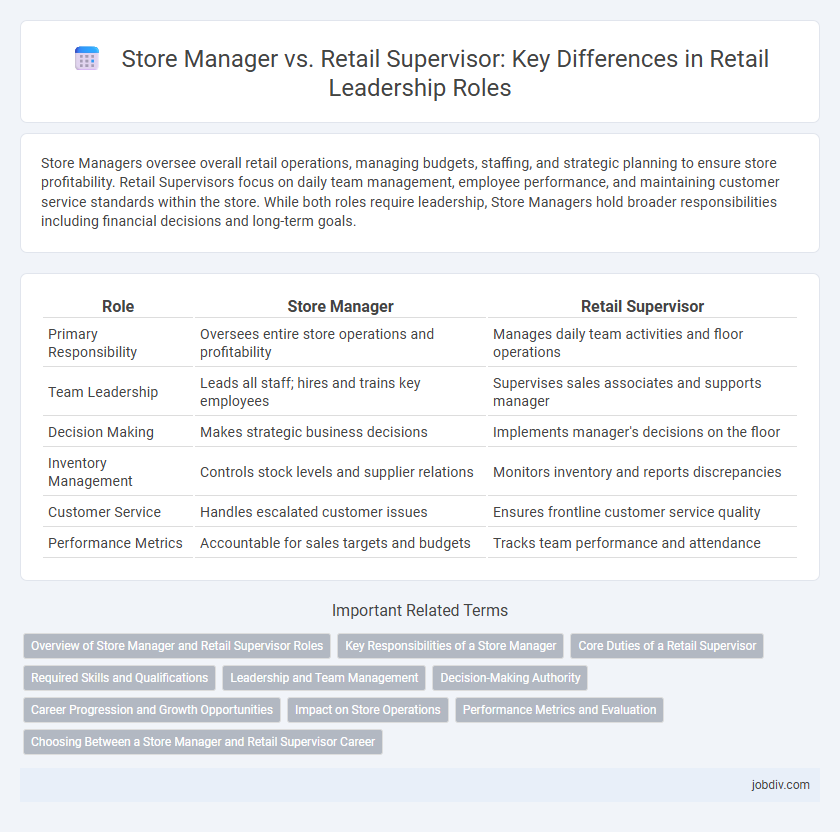Store Managers oversee overall retail operations, managing budgets, staffing, and strategic planning to ensure store profitability. Retail Supervisors focus on daily team management, employee performance, and maintaining customer service standards within the store. While both roles require leadership, Store Managers hold broader responsibilities including financial decisions and long-term goals.
Table of Comparison
| Role | Store Manager | Retail Supervisor |
|---|---|---|
| Primary Responsibility | Oversees entire store operations and profitability | Manages daily team activities and floor operations |
| Team Leadership | Leads all staff; hires and trains key employees | Supervises sales associates and supports manager |
| Decision Making | Makes strategic business decisions | Implements manager's decisions on the floor |
| Inventory Management | Controls stock levels and supplier relations | Monitors inventory and reports discrepancies |
| Customer Service | Handles escalated customer issues | Ensures frontline customer service quality |
| Performance Metrics | Accountable for sales targets and budgets | Tracks team performance and attendance |
Overview of Store Manager and Retail Supervisor Roles
Store Managers oversee the entire store operation, managing staff, inventory, sales targets, and customer experience to ensure profitability and efficiency. Retail Supervisors focus on supervising daily employee activities, enforcing company policies, and supporting Store Managers in achieving operational goals. Both roles are critical for smooth store performance, with Store Managers holding broader leadership responsibilities and Retail Supervisors emphasizing team coordination and task execution.
Key Responsibilities of a Store Manager
Store Managers oversee overall store operations, including staff management, inventory control, and sales performance, ensuring alignment with company goals. They develop strategic plans to optimize customer experience and drive revenue growth while maintaining compliance with policies and safety regulations. Store Managers also handle budgeting, hiring, training, and resolving complex customer issues, distinguishing their role from Retail Supervisors who focus more on day-to-day team supervision.
Core Duties of a Retail Supervisor
A Retail Supervisor oversees daily store operations, ensuring staff compliance with company policies and delivering exceptional customer service. Core duties include managing employee schedules, monitoring inventory levels, and resolving customer complaints to maintain store efficiency. They act as a liaison between the store manager and sales associates, driving team performance and achieving sales targets.
Required Skills and Qualifications
Store Managers require strong leadership, strategic planning, and financial management skills, alongside experience in inventory control and customer service excellence. Retail Supervisors need effective team management, communication abilities, and knowledge of day-to-day store operations, often supported by prior retail experience or a high school diploma. Both roles benefit from proficiency in point-of-sale (POS) systems, problem-solving capabilities, and the ability to motivate staff to achieve sales targets.
Leadership and Team Management
Store Managers hold ultimate accountability for overall store performance and strategic leadership, directing daily operations and driving sales growth. Retail Supervisors focus specifically on managing team schedules, training staff, and ensuring customer service standards are met within their shift. Effective leadership in retail requires Store Managers to cultivate a high-performing culture while Retail Supervisors execute hands-on team management to maintain operational efficiency.
Decision-Making Authority
Store Managers hold greater decision-making authority, overseeing the entire store's operations, including staffing, inventory management, and financial performance. Retail Supervisors primarily execute decisions by managing daily staff activities and ensuring compliance with store policies. The distinction lies in strategic planning vested with Store Managers versus operational oversight by Retail Supervisors.
Career Progression and Growth Opportunities
Store Managers oversee overall store operations, strategic planning, and team leadership, positioning them for higher executive roles such as regional manager or district manager. Retail Supervisors focus on day-to-day staff management and customer service, serving as a vital stepping stone for advancing to Store Manager positions. Career growth from Retail Supervisor to Store Manager typically involves gaining experience in inventory control, sales analysis, and staff development.
Impact on Store Operations
Store Managers hold comprehensive responsibility for overall store performance, including sales targets, inventory management, and staff development, directly influencing profitability and customer satisfaction. Retail Supervisors focus on daily operational tasks such as workforce scheduling, merchandising compliance, and maintaining store standards, ensuring smooth and efficient store functions. The synergy between store managers and retail supervisors significantly enhances operational efficiency and drives consistent store success.
Performance Metrics and Evaluation
Store Managers typically oversee overall sales targets, customer satisfaction scores, and inventory turnover rates, driving store profitability and strategic planning. Retail Supervisors focus on employee performance metrics, such as task completion rates, attendance, and adherence to company policies, ensuring smooth daily operations on the sales floor. Evaluation of Store Managers emphasizes leadership impact on financial outcomes, while Retail Supervisors are assessed based on team productivity and operational efficiency.
Choosing Between a Store Manager and Retail Supervisor Career
Choosing between a career as a Store Manager or Retail Supervisor depends on desired responsibilities and leadership scope within retail operations. Store Managers oversee overall store performance, including sales targets, staff management, and inventory control, while Retail Supervisors focus more on daily team coordination and specific department oversight. Understanding the distinct roles, career growth opportunities, and impact on retail business success helps in making an informed decision aligned with personal career goals.
Store Manager vs Retail Supervisor Infographic

 jobdiv.com
jobdiv.com